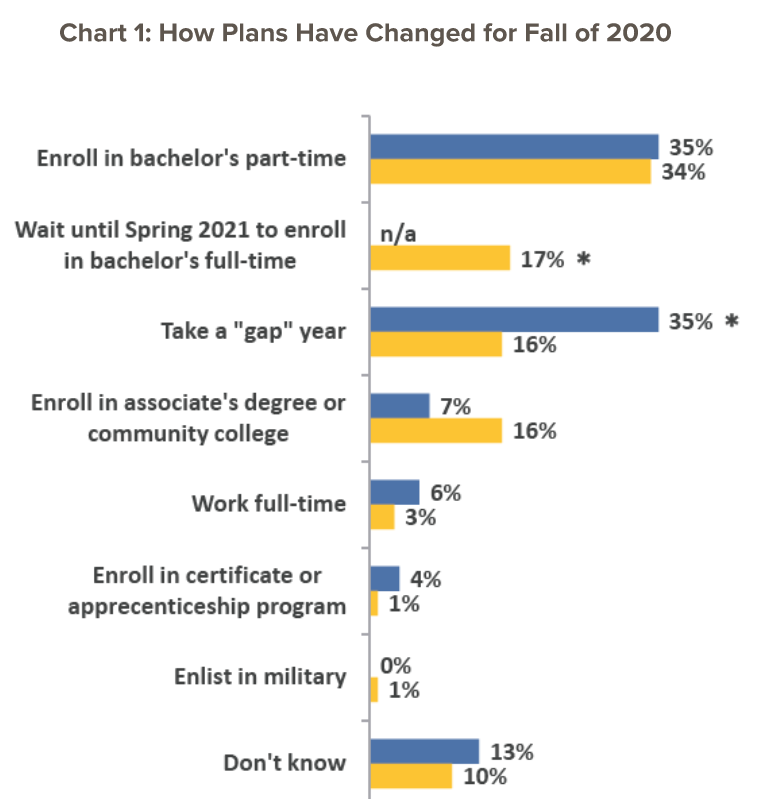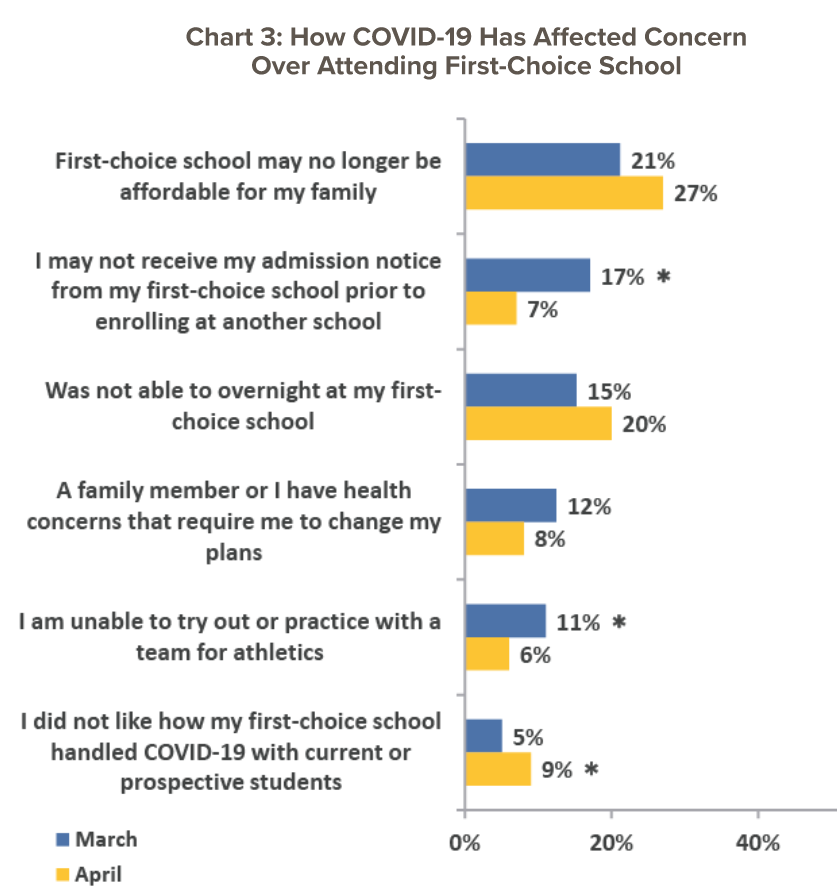
A whopping two-thirds of graduating high school students say they expect to pay “much” less in tuition and fees if campuses do not re-open this fall amid the coronavirus pandemic.
The “studentPOLL” survey published last week polled more than 1,000 high school students over three days at the end of April. Sixty-seven percent report that they wouldn’t expect to pay full tuition price if starting college in an online format. More than half (52%) say they’ve had at least one parent or guardian who has lost a job or been furloughed; another 12% say that even though they’ve already put down a deposit for a four-year university, they plan on changing their plans and not attending.
However, 80% of respondents that have placed a deposit still say they are “very likely” to attend the school in which the deposit was made.
“The findings reveal a prospective-student market still in flux with uncertainties about how their college plans for this fall will play out,” the survey report, which was conducted by Art & Science Group, says.
STUDENTS DON’T WANT TO PAY FULL PRICE FOR LESSER EXPERIENCE
However, the survey shows only a slight drop in students planning to enroll in a part-time bachelor’s program (35% to 34%). Students reporting they would take a “gap year” dropped significantly from 35% in March to just 16% the next month. Interestingly, those planning to enroll in a community college or associate’s degree program increased from just 7% in March to 16% in April.
“The bottom line, most students expect to pay much less in tuition and fees if online learning becomes mandatory in the fall due to COVID-19,” the survey states. “In fact, most students expect costs to be adjusted and not just to account for the irrelevance of room and board. More specifically, two-thirds of respondents still planning to attend a four-year college or university full-time in the fall would expect to pay much less in tuition and fees.
“Only one-fifth would be willing to pay the same tuition and fees if campus was not able to be opened.”

studentPOLL graphic
MAJORITY OF RESPONDENTS ‘CONCERNED’ ABOUT THEIR ABILITY TO ATTEND THEIR FIRST-CHOICE COLLEGE
According to the survey, two-thirds (67%) of incoming college students “express significant doubt about their ability to attend their first-choice school.” Specifically, responding students that are “very concerned” about their ability to attend their first college choice jumped from 17% in March to 26% in April. Those “somewhat concerned” also increased from 29% in March to 32% in April. Meanwhile, those that are “not concerned yet” dropped from 30% to 25% and those “not concerned” decreased from 23% to 14%.
“While the overall proportions have remained constant, the new findings point toward an intensification of student concern about enrolling in their college of choice in fall of 2020,” the survey says.
The number one reason listed why they have concern over attending their first-choice college comes down to money. Some 27% of respondents in April said their first school choice “may no longer be affordable for my family,” which was up from 21% in March. The next highest reason in April was that students were “not able to overnight at my first-choice school,” which 20% of respondents listed as the main concern.
“Given students’ increasing exposure to income insecurity, it is perhaps inevitable that we would see financial concerns starting to move even more to the forefront for students,” the survey concludes. “These financial concerns, paired with the disruption of the college choice process, specifically the inability to visit schools overnight, now stand out as the primary impediments.”
MAJORITY OF STUDENTS HAVE “NO INTEREST” IN ENROLLING IN AN ONLINE DEGREE PROGRAM

studentPOLL graphic
Another trend that could be slightly disturbing for colleges the survey revealed is the majority of students have “no interest in enrolling in online degree programs.” Some 59% of respondents said they wouldn’t have an interest in an online degree program, up from just 49% in March. Those that reported they would be “a bit more likely to consider” dropped from 19% in March to 17% in April. And those that reported they’d be “somewhat more likely to consider” online learning dropped from 17% in March to 10% in April.
“Our research around the impact of COVID-19 on prospective students shows that there has not been a groundswell of interest in abandoning a traditional, residential college experience in favor of an online degree program,” the survey says. “As noted above, most students who were looking to attend a 4-year college this fall as full-time students are still at least fairly confident that the college or university they are planning to attend will re-open its campus in time for fall 2020 semester classes.”
Either way, the survey concludes, the coronavirus pandemic could potentially have a massive impact on the immediate future of higher education.
“These findings confirm our fears that the COVID-19 pandemic is likely to have a substantial, perhaps even dramatic, effect on the way students are making their college choices,” the survey says. “The crisis has sustained potential to have a profound impact on where students choose to go to college, and a significant impact on whether many students go to college at all this fall. It also may cause a marked increase in “summer melt” of students who have already deposited. And its financial impact appears to be creating substantial downward pressure on what colleges and universities can charge in the wake of the pandemic if campuses are unable to reopen for in-person classes.”
DON’T MISS: BIZ ED AFTER THE WAR ON COVID-19: HOW BUSINESS SCHOOLS CAN WIN THE PEACE or SCHOOLS BRACE FOR REVENUE DROPS, CONSIDER STAFF LAYOFFS











Questions about this article? Email us or leave a comment below.